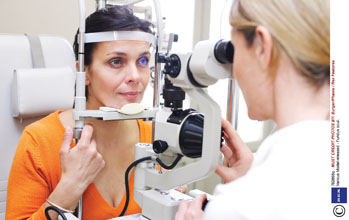 Six million people are risking sight loss by cutting corners to save cash, according to YouGuv research to mark National Eye Health Week (NEHW), which started on Monday.
Six million people are risking sight loss by cutting corners to save cash, according to YouGuv research to mark National Eye Health Week (NEHW), which started on Monday.
Millions of adults across Britain do not go for regular sight tests because they believe they cannot afford to (13 per cent of the population as a whole), with 43 per cent risking their sight and health by not having regular examinations. More than nine in 10 people know about the wider health benefits of sight tests, but this is not resulting in people visiting their optometrist.
NEHW chairman David Scott-Ralphs commented: 'This is a massive public health issue. Many people do understand the importance of a sight test, but there is great concern that they are still avoiding having one, often citing cost grounds. Many people qualify for a free NHS sight test and may also qualify for help with the cost of spectacles or contact lenses.'
Register now to continue reading
Thank you for visiting Optician Online. Register now to access up to 10 news and opinion articles a month.
Register
Already have an account? Sign in here
